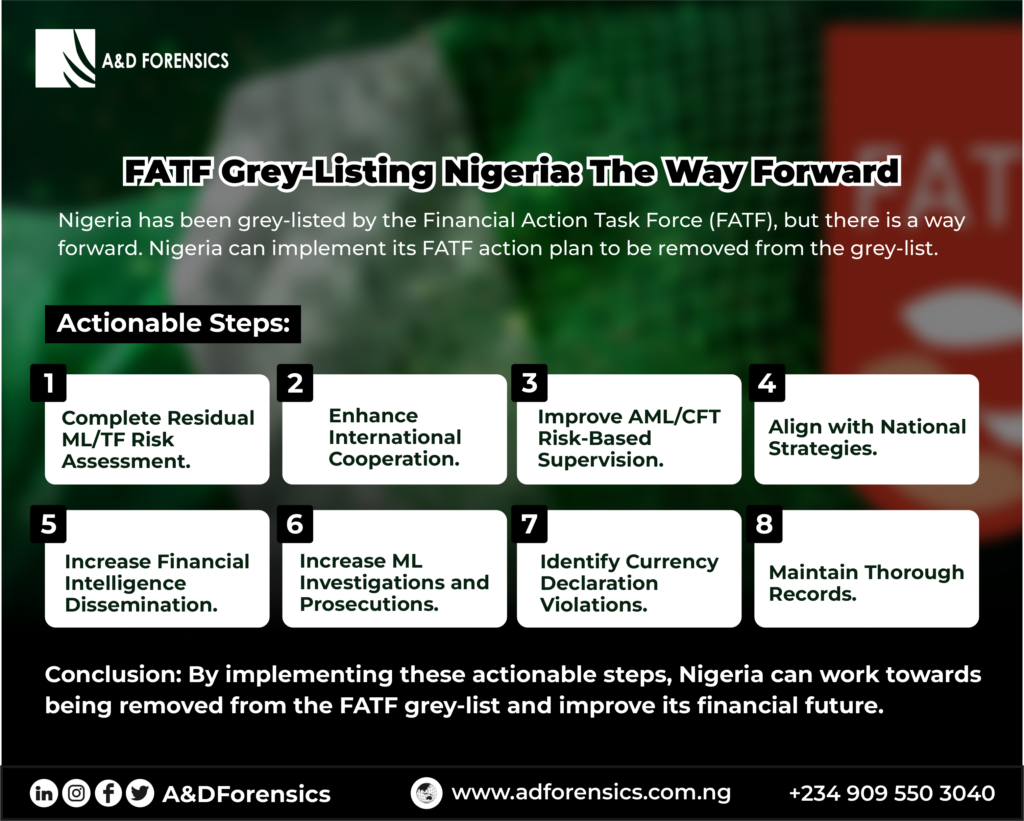Nigeria has been added to the FATF Grey-List alongside South Africa. This was disclosed at the end of the FATF Plenary. The second Financial Action Task Force FATF Plenary under the two-year Singapore Presidency of T. Raja Kumar held between 22-24 February 2023. What does ‘Grey-Listing’ mean for Nigeria? This article will tell you more.

What is FATF?
The Financial Action Task Force (FATF) is an intergovernmental organization that aims to combat money laundering and terrorism financing around the world. One of its key tools is the creation of lists that identify countries that are deemed to have inadequate anti-money laundering and counter-terrorism financing (AML/CFT) measures.
There are two main FATF Lists:
- FATF Blacklist and
- FATF Grey List
- The FATF Blacklist (also known as the “High-Risk and Non-Cooperative Jurisdictions” list) consists of countries that have serious deficiencies in their AML/CFT measures and have not made sufficient progress in addressing them.
- The FATF Grey List (also known as the “Jurisdictions under Increased Monitoring” list) consists of countries that have deficiencies in their AML/CFT measures, but have committed to addressing them and are making progress in doing so.
Nigeria is Now on FATF-Grey List
According to FATF, in February 2023, Nigeria made progress in improving its AML/CFT regime, including improving its legislative framework, assessing ML/TF/PF risks, and implementing targeted financial sanctions.
However, The FATF and FATF-style regional bodies (FSRBs) will continue to work with Nigeria and other countries in the FATF Grey-List as they report on the progress achieved in addressing their strategic deficiencies. The FATF also calls on Nigeria and other Grey Listed Countries to complete their action plans expeditiously and within the agreed timeframes.
Some other countries on the FATF Grey-List alongside Nigeria includes: Albania, Barbados, Burkina Faso, The Cayman Islands, The Democratic Republic of Congo, Gibraltar, Haiti, Jamaica, Jordan, Mali, Mozambique, Panama, Philippines, Senegal, South Africa (recently added alongside with Nigeria), South Sudan, Syria, Tanzania, Turkiye, Uganda, United Arab Emirates and Yemen.
Cambodia and Morocco were jurisdictions listed to no longer be subject to increased monitoring by the FATF. Hence, removed from the FATF Grey-List.
Negative Effects of Being Included in FATF Grey-List
A nation’s economy and image may suffer significantly if it is placed on the FATF Grey List. Financial entities might be reluctant to work with organizations or people from the nations on the Grey List, and there might be more scrutiny and reporting requirements for transactions involving those nations.
These are some of the effects:
- It adversely affects a nation’s economy when other nations begin to view the country on the grey list as a risky place to engage.
- Countries that are grey-listed also experience a hit to their tourism industries as travellers tend to steer clear of these nations.
- It is challenging for the countries on the grey list to get extra funding from international organizations like the IMF and other borrowers.
- Grave issues associated with greylisting, such as currency depreciation, inflation, and trade deficits, send the economy into disarray.
- As foreign organizations downgrade the ratings of these nations, the nation’s bond market declines.
- Grey listed countries could get boycotted on the international stage by other countries.
3 Positive Effects of Being Included in FATF Grey-List
- Participation in the FATF Grey-List could aid a nation involved in illegal activities in reforming itself.
- The greylist serves more as a warning to keep a nation from being included to the more stringent blacklist, where laws and fines are more harsh.
- Greylisting might aid a nation in righting its wrongs and reviving its struggling economy.
Potential Reaction and the Way Forward For Nigeria

To be able to leave the FATF Grey-List, Nigeria will will work to implement its FATF action plan by:
- Completing its residual Money Laundering (ML) /Terrorist Financing (TF) risk assessment.
- Enhancing formal and informal international cooperation in line with ML/TF risks.
- Improving Anti-Money Laundering (AML)/ Countering the Financing of Terrorism (CFT) risk-based supervision of Financial Institutions (FIs) and Designated Non-Financial Businesses and Professions (DNFBPs) and enhancing implementation of preventive measures for high-risk sectors.
- Ensuring alignment with other national strategies relevant to high-risk predicate offences.
- Showing an increase in the Nigerian Financial Intelligence Unit (NFIU)’s dissemination of financial intelligence and the use of that information by Law Enforcement Agencies (LEAs)
- Showing a steady increase in ML investigations and prosecutions in accordance with ML risks.
- Promptly identifying currency declaration violations and enforcing appropriate sanctions.
- Maintaining thorough records of frozen, seized, confiscated, and disposed assets.
Conclusion
Overall, the FATF’s Black and Grey Lists serve as a powerful tool to encourage countries to take stronger measures to combat money laundering and terrorism financing. By identifying and publicly calling out countries that are not meeting international standards, the FATF helps to incentivize those countries to take the necessary steps to improve their AML/CFT measures and protect the integrity of the global financial system.
It is believed that Nigeria will do what is expected of it to meet up with the standards set by the Financial Action Task Force (FATF) to regain international confidence in its ability to handle matters of AML/CFT.
At A&D Forensics, we help you implement AML/CFT policies and ensure your Web 3 business is compliant. Contact us for any of our services here.






